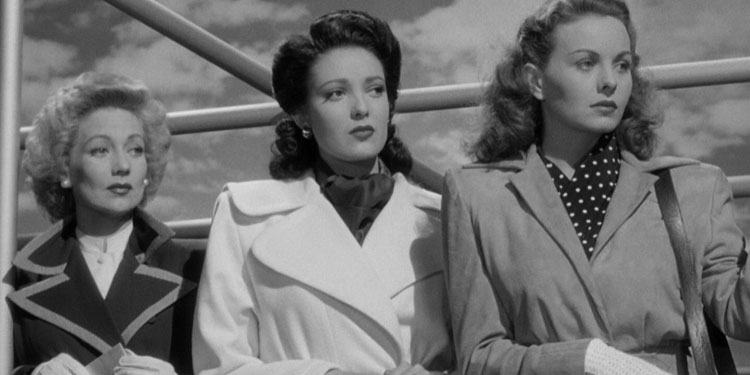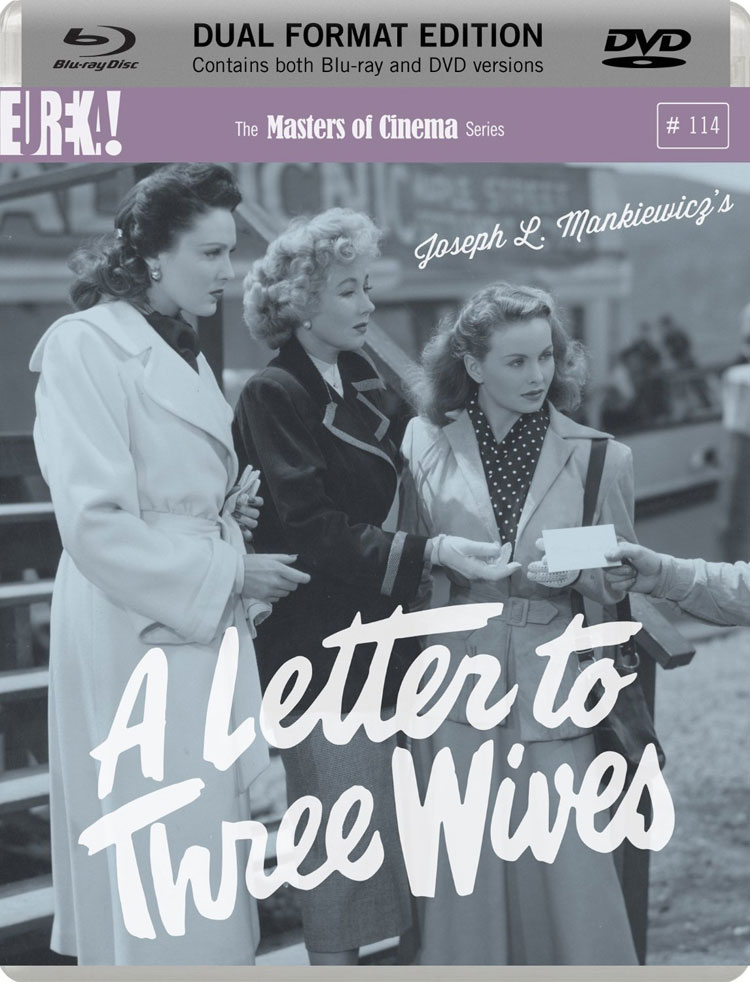
Director: Joseph L. Mankiewicz
Running Time: 103 mins
Certificate: U
Release Date: June 29th 2015 (UK)

I have always wanted to see A Letter To Three Wives, but I’m almost ashamed to say I’d never watched it before. The reason I was keen to see it is that All About Eve is one of my favourite movies ever, and this is the other film for which Joseph L. Mankiewicz won both a Best Director and Best Screenplay Oscar.
I’m glad to say I wasn’t completely disappointed by the film, although I can see why the movie has fallen out of favour compared to much of Mankiewicz’s other work, such as Cleopatra and The Barefoot Contessa. While not that many younger people have seen the 1949 Oscar winner, they may find the plot oddly familiar, as more recently it served as the basis for an episode of The Simpsons.
Deborah (Jeanne Crain), Lora Mae (Linda Darnell) and Rita (Ann Sothern) are heading off on a boat for the day to look after a group of children, when they receive a letter from their ‘friend’, Addie Ross, who says she has abruptly left town and has taken one of their husbands with her.
Initially the women brush it off as one of Addie’s games, but as the day goes on they all start to wonder whether their hubby may have left them and they each reminisce about their lives and relationships. Deborah loves the idea of living a posh, middle-class, Country Club life, but feels that she will never quite fit in due to her farm girl background. Lora Mae grew up poor and knew exactly what she was doing when trying to reel in older, divorced Porter, but after genuinely falling for him she fears they will never escape the almost transactional nature of their early relationship. Rita meanwhile is a successful radio writer, who has a tendency to put the needs of her boss over those of her husband (played by a young Kirk Douglas), which leaves him feeling rather emasculated.
All the husbands like Addie (who we never actually see, although she provides the narration) and see her as a kind of perfect woman, but has any of them actually run off with her?
Fairly early on it becomes apparent why A Letter To Three Wives has not stayed the well-loved classic it might have been, and that’s to do with its rather old-fashioned attitude towards women. Deborah seems almost desperate to feel like she’s given up her individuality and become an adjunct to her husband, while Rita must learn that the man is in charge and that if she’s going to be a career woman, she can’t expect to be an independent one. But that’s the problem with women – they will insist on thinking they’re people in their own right!
It is incredibly old-fashioned in its attitudes, but it’s also one of the many older films which is now seen as sexist, but which was actually thought as being quite progressive at the time, in this case particularly how it dealt with the issues left behind after World War II, when women had been allowed out of the house but were suddenly meant to go back inside again when the men returned home. Things have moved on massively since the 1940s though (thank goodness), leaving A Letter To Three Wives far behind and with a view on sexual politics that would be actively offensive if anyone made the same movie today.
If you look past that though it is a very entertaining film. It’s smartly written (attitudes aside), and cleverly plotted as it looks into the lives of the three women and the situation they now find themselves in, all with a great hook of the audience waiting to discover who may have run off with Addie. Even the sexist side is worth watching, as it’s an interesting document on women’s position at the time and what was seen as the way to be happy.
The movie looks extremely good on Blu-ray. In fact it’s looking better than any film from 1949 has a right to, helped by the great classic Hollywood visuals and a restoration that’s done an excellent job of removing grain and other problems. You also get a choice of 5.1 sound or the original mono audio and a couple of decent special features, including radio versions of A Letter To Three Wives and newsreel footage of the Academy Awards where Mankiewicz won his Oscar for the film.
Overall Verdict: This is the sort of film – of which there are quite a few – which would be classed as a bona fide classic if it weren’t for the fact times have moved on and its attitudes, in this case about women’s place in society, are positively prehistoric. Outside its ‘little women should stop having thoughts of their own’ views it is an extremely well made and entertaining film, but it certainly gets no points for modern feminism values.
Reviewer: Tim Isaac





Leave a Reply (if comment does not appear immediately, it may have been held for moderation)